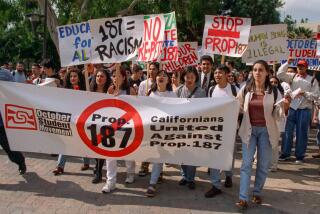Racial Majority? Ethnic Minority? That’s All Beside the Point Now
The other day, I eavesdropped on a conversation between several U.S.-born Latinos who asked a fellow student whether she, who was born in Guatemala but raised half of her life in the United States, considered herself “Latina” or “American” or “what?”
The rather bookish student smiled and, without blinking, told her schoolmates, “I’m Mayan.” She then uttered a few phrases in her native Kanjobal dialect. “Wow, that’s cool!” one of the students responded.
The exchange illustrates how the recent news that California’s “minorities” are now the “majority” is merely a numbers game of race and ethnicity. Such thinking belies the complexity of our many variations of cultural identity and limits our ability to maneuver in the global economy.
It’s time to reformulate many popularly held notions of what constitutes being “ethnic” or “white” in California and across the U.S. If we do not, we will lose an advantage given to us by our rich cultural life that we can use in the economic and political arenas.
The fact is, it is not clear anymore who is or isn’t “ethnic” in California or anywhere else. With the exception of small, but important, changes made to this year’s U.S. Census, our predominant ethno-racial classifications seem locked in industrial-strength categories. Meanwhile, global business and economics and society at large are being driven by complex needs to be “networked,” “merged” and “flexible,” without a concomitant and equally rapid shift in the way we describe and identify ourselves. We need more dynamic, fluid ways to speak about each other in this most complex of times.
Take Los Angeles’ upcoming mayoral elections. Some of us are perplexed by the notion that the “Latino vote” is being split by the candidacies of Antonio Villaraigosa and Xavier Becerra. Does the idea of a “Latino vote” or a “Latino bloc” take into account the Mayan student who was born in the place that is known in Spanish (her second language) as “America Latina” but who does not identify with being a “Latina”?
And, by the way, why isn’t anyone writing about how James Hahn, Steve Soboroff and Joel Wachs are “splitting the white vote”?
The reality of a California returning to pre-Gold Rush demographic patterns, combined with the cutting-edge position of the state on the world economic stage, requires that we dismantle these categories as quickly as possible. The doomsayers of the 1980s who believed that our hybrid culture was a competitive disadvantage in the face of more monocultural Japan and Germany were plainly wrong. The new economy was given birth in this state precisely because we were so marvelously different from each other and from the rest of the world.
Rather than simply teach students about “Latinos,” “African Americans,” “Asians,” “Native Americans” or other broad and often meaningless categories of people, we must prepare today’s students for the new global realities. To do this, we must both know more about and also transcend ethnic identity.
And where else can Los Angeles students better take advantage of the fact that they--more than almost any other students on the planet--are exposed to so many cultures? The Los Angeles Unified School District alone has a greater share than most school districts of students from the thousands of ethnic groups and cultures around the world. But the students who encounter a classmate from Eritrea or Laos will learn little to nothing about them in school during Black History Month or Chinese New Year’s celebrations. They could learn a lot, though, from each other if schools create and foster an environment and an institutional framework in which students can actually communicate beyond stale categories.
The current historical moment requires that we break up what currently passes for ethno-racial categories, ideas that box in our thinking and our institutions. Our children cannot afford to lose the valuable knowledge available right in front of them in this most global of cities and countries.
More to Read
Sign up for Essential California
The most important California stories and recommendations in your inbox every morning.
You may occasionally receive promotional content from the Los Angeles Times.










